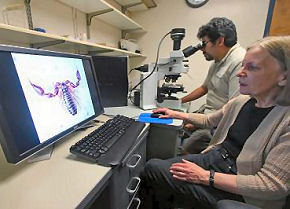28 April 2012
Antibiotics found to have transgenerational effects
by Will Parker
 Male pseudoscorpions treated with tetracycline suffer significantly reduced sperm viability and this toxic effect is passed on to their untreated sons, say University of Nevada researchers who believe a similar effect could occur in humans.
Male pseudoscorpions treated with tetracycline suffer significantly reduced sperm viability and this toxic effect is passed on to their untreated sons, say University of Nevada researchers who believe a similar effect could occur in humans.
Tetracycline is commonly used as an additive in animal feed and also as an antimicrobial therapy in developing countries. Researcher David Zeh notes that this is the first time a transgenerational effect from antibiotics has been observed. His full report appears in the journal Scientific Reports.
Zeh's work involved a three-generation study of Cordylochernes scorpioides, a small scorpion-like arachnid. To control for genetic influences, in the first generation, brothers and sisters from each of 21 broods were either treated with weekly doses of tetracycline from birth to adulthood or were reared as untreated controls. Subsequent generations were not treated with tetracycline.
Tetracycline has a significant detrimental effect on male reproductive function and sperm health in pseudoscorpions, reducing viability by up to 25 percent. "And now we know that effect is passed on to the next generation," said Zeh, adding that the effect was not seen in subsequent generations.
Co-researcher Jeanne Zeh speculates that tetracycline may induce epigenetic changes in male reproductive tissues that are be passed to sons. Epigenetic changes do not alter the sequence of DNA, but do change the way genes are expressed.
Related:
Discuss this article in our forum
Bacterial "disabler" treatment side-steps antibiotic resistance
"It's not all in the genes," say epigenetic code-breakers
Intriguing evidence of charitable behavior in bacteria
25% Of Prescribed Antibiotics Ineffective
Source: University of Nevada
